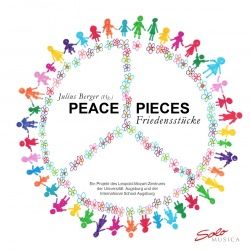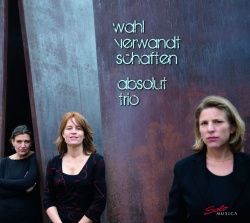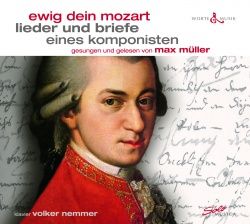Viviana Araiza Staffini – Amato Belcanto
Description
The mezzo-soprano Viviana Araiza Staffini was born in Munich and spent part of her childhood in the USA and Italy. She studied at the Munich College of Music and completed her studies at the International Opera Studio of the Zurich Opera House.
A key role in her career was Bizet’s Carmen, with which she, with the Sapporo Symphony Orchestra, made her Japanese debut to great acclaim in 1990. Mozart is also prominent in her repertoire, and Riccardo Muti called her to La Scala in Milan in the role of Vitellia in La clemenza di Tito. She has also gained acclaim on the concert stage and often performs at venues like the Cologne Philharmonie, the Alte Oper in Frankfurt and the Dresden Philharmonie.
Tracklist
Ensemble Raro – Dohnanyi Dvorak Suk
Description
Ensemble Raro was formed in 2004 by four extraordinary young musicians. Ensemble Raro is constantly looking for creative programme forms, in which they aim to establish new cultural, musical and literary connections. Raro is the ensemble in residence at the Chiemgauer Musikfrühling Festival in Traunstein, SoNoRo Festival in Bucharest, Kobe International Music Festival, Pelerinages in Munich and Mozartiade in Augsburg. They are actively involved in performing contemporary chamber music repertoire. They gave a British and German premieres of Peteris Vasks’s Piano Quartet. Their performances of Walter Braunfels’ and George Enescu’s works in Pelerinages series in Munich received a high critical acclaim.
When a new musician is being considered for the ensemble, personal compatibility is the criterion, not technique. That was the case with the Ukrainian violinist Andrej Bielow. “It was clear from the first note that we would play together,” says Diana Ketler, “because he can completely open himself emotionally – to his colleagues, to the audience, to the music.”
Tracklist
Piano Quintet in C minor, Op. 1 [28:56]
1. Allegro (8:19)
2. Scherzo. Allegro vivace (4:36)
3. Adagio, quasi andante (7:43)
4. Finale. Allegro animato (8:07)
ANTONÍN DVOØÁK
Piano Quartet in E flat major, Op. 87 [36:35]
5. Allegro con fuoco (8:41)
6. Lento (10:09)
7. Allegro moderato, grazioso (7:41)
8. Finale. Allegro ma non troppo (9:52)
JOSEF SUK
9. Elegie Op. 23 for Piano trio
Adagio [5:56]
TT 71:45
Collegium Vocale zu Franziskanern – Sacred and Profane
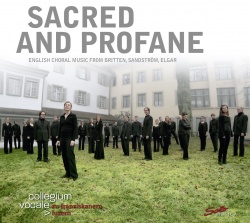 Artists: Collegium Vocale zu Franziskanern
Artists: Collegium Vocale zu Franziskanern
Title: Sacred and Profane
Catalogue No.: SM 185
Release: 06.05.2013
Description
Benjamin Britten (1913-1976), the creator of the epic War Requiem, is rightly regarded as the most important English composer of the 20th century. His works for a cappella choir show an overwhelming variety of styles, texts, and compositional techniques. And for these, choirs are extremely grateful. Benjamin Britten, who was known not only as a composer but also as an experienced practitioner, was able to precisely gauge the possibilities of each respective performer; he knew exactly which details in the score were necessary to achieve the desired effect. Excellent choral music is to be found in settings ranging from children’s and school choirs to oratorio choirs and professional ensembles. The choices made for this recording – major works from different creative phases throughout Britten’s life – reflect this diversity. The inclusion of works by William Byrd, Henry Purcell, Edward Elgar, and Ralph Vaughan Williams also affords an opportunity to trace a line of tradition in English choral music.
The Collegium Vocale was founded in 2005 by Ulrike Grosch. Originally made up of participants of a workshop led by Ton Koopman, the choir consists primarily of students and alumni of Swiss conservatories and music schools. The choir and its director share an enthusiasm for the discovery of the new, combined with high vocal expertise and a particular passion for working on language, diction and sound.
Tracklist
Three Shakespeare Songs Benjamin Britten
An Ode for Music Zoltán Kodály
Death of the Hills Edward Elgar
Love`s tempest
Serenade
A Hymn to the Virgin Benjamin Britten
Verum Corpus William ByrdAve
Hear My Prayer, O Lord Henry Pursell/Sven-David Sandström
Hymn to St Cecilia Benjamin Britten
Sacred and Profane Benjamin Britten
Neue Philharmonie Westfalen , Jan Schulte-Bunert – Escapades
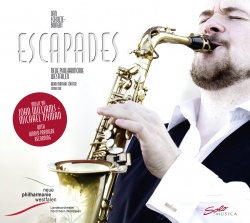 Artists: Neue Philharmonie Westfalen , Jan Schulte-Bunert
Artists: Neue Philharmonie Westfalen , Jan Schulte-Bunert
Title: Escapades (CD + 2 LP Vinyl)
Catalogue No.: SM 186
Release: 22.04.2013
Description
John Williamsis today Hollywood’s leading film composer. Escapades for saxophone and orchestra is based on the music to Catch me if you can, the 2002 comedy about a con man starring Leonardo DiCaprio and Tom Hanks. It was directed by Steven Spielberg, who in this film worked with “his” composer John Williams for the twentieth time.
Michael Nymanis one of the most dazzling figures in the post-modern music scene. Where the Bee dances was commissioned by the Bournemouth Sinfonietta and performed on July 13, 1991 during the Cheltenham Music Festival.
Andrei Eshpaiwas born in 1925 the son of a composer and folk song researcher in Russia. He wrote the Saxophone Concerto in 1985/86.
The New Philharmonic Orchestra of Westphalia was founded by a merger of two orchestras in the northern Ruhr area in 1996: the Westphalian Symphony Orchestra in Recklinghausen and the Philharmonic Orchestra in Gelsenkirchen.
The conductor Heiko Mathias Förster makes regular guest appearances with orchestras all over the world. The Israel Symphony Orchestra, the National Taiwan Symphony Orchestra, the Radio Symphony Orchestra of Berlin, the Orquesta Sinfónica del Gran Teatre del Liceu in Barcelona and the Prague Symphony Orchestra are only a few of the ensembles Heiko Mathias Förster has conducted in recent years.
Tracklist
Music: J. Williams
„Where the Bee dances“ for Saxophone and Orchestra
Music: Michael Nyman
Konzert for Saxophone and Orchestra
Music: Andrei Eshpai
Sharon Brauner – Jewels
Description
The Berlin lady, 43 years old comes from a family who five decades certain with the German movie business of the last as actress in moving images of diverse genres quite its share, but now she is clearly on the music. On this album we find a whole new musical presentation of wonderful well known evergreens sang in the Yiddish language.
There is a classic like “Bay mir bistu sheyn (Tome, you are beautiful)” moved to the beach of Copacabana, there you here sounding waltzes in electro sound and tangos like a hot Flirt in the morning at the Club, with the ‘Tumbalalaika’ she then goes eastward, but not in the typical folcloric dress and the ballads of the album sound more like pop than what is otherwise combined with Yiddish music in.
Sharon Brauner brings us back a culture, without any nostalgic transfiguration into a sound that is far away from hard retro culture and instead, well – it comes pretty sexy around the corner.
Tracklist
Chassene Walz
S`ken nit meiglich sein
Tango Apassionata
Ikh hob dikh tsufil lib
Kaddish – Soldatn
Beltz
Rozinkes mit Mandlen
Sheyn vi di levone
Tumbalalaika
Adon olam
Oyfn pripetchik
Christiane Oelze – Strauss Lieder
Description
Their partner on the conductor’s rostrum to witness by the rank of the soprano Christiane Oelze: Herbert Blomstedt, Riccardo Chailly, Claudio Abbado, Pierre Boulez, Christoph von Dohnányi, Sir John Eliot Gardiner, Michael Gielen, Carlo Maria Giulini, Nikolaus Harnoncourt, Christopher Hogwood, Marek Janowski, Fabio Luisi, Sir Neville Marriner, Kurt Masur, Kent Nagano and Sir Simon Rattle. Hardly a renowned Orchestra with Christiane Oelze had not already performed.
In addition to her work in Opera and concert, Christiane Oelze has dedicated herself building a challenging and varied song repertoire; accompanied by many well-known pianists and their longtime song partner Eric Schneider.
Many of their recordings of the songs received high praise in the press, including songs by Anton Webern, settings of Goethe, and last but not least ‘forbidden songs’ the exiled composer Ullmann, Korngold and Weill.
Tracklist
Nichts, op.10 Nr. 2
Die Nacht, op.10 Nr. 3
Allerseelen, op.10 Nr. 8
Ständchen, op.17 Nr. 2
Cäcilie, op.27 Nr. 2
Aufforderung, op.27 Nr. 3
Morgen! op.27 Nr. 4
Traum durch die Dämmerung, op.29 Nr. 1
Schlagende Herzen, op.29 Nr. 2
Blauer Sommer, op.31 Nr. 1
Das Rosenband, op.36 Nr. 1
Hat gesagt – bleibt’s nicht dabei, op.36 Nr. 3
Befreit, op.39 Nr. 4
Muttertändelei, op.43 Nr. 2
Freundliche Vision, op.48 Nr. 1
Waldseligkeit, op.49 Nr. 1
Säus’le liebe Myrthe, op.68 Nr. 3
Einerlei, op.69 Nr. 3
Schlechtes Wetter, op.69 Nr. 5
Vier letzte Lieder für Sopran und Orchester, op. posth. (AV 150) Fassung für Sopran und Klavier
Julius Berger – Peace – Pieces
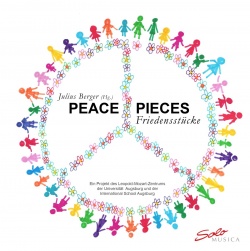 Künstler: Julius Berger
Künstler: Julius Berger
Titel: Peace – Pieces (Buch und CD)
Katalog Nr.: SM 181
Veröffentlichung: 18.03.2013
Produktbeschreibung
Für die Aufnahmen der beiliegenden CD besuchten bekannte Komponisten wie Sofia Gubaidulina, Giovanni Bonato, Manuela Kerer und Franghiz Ali-Sade Dimitri das „Leopold-Mozart-Zentrum“ der Universität Augsburg, um mit den Studierenden und Schülern eigene Werke, die zum Teil für das Projekt entstanden sind und das Thema „Frieden“ aufgreifen, zu erarbeiten.
Tracklist
Manuela Kerer (1980) – Peace-Piece (2012)
Dmitri Schostakowitsch (1906 – 1975) – Streichquartett Nr. 8 op. 110 (1960)
Fassung für Violoncelloquartett von M. Burovik
Sofia Gubaidulina (1931) – Fata Morgana: Die tanzende Sonne (2002) für 8 Violoncelli
Franghiz Ali-Sade (1947)– Schüschtar (2003) Version für 8 Violoncelli
Manuela Kerer (1980) – Dolce malinconia (2010) für Violoncelloquartett
Manuela Kerer (1980) – Friduscal (2010/11) nach dem Choral „Du Friedefürst Herr Jesu Christ“von Johann Sebastian Bach BWV 67 für Violoncellosextett
Absolut Trio – Wahlverwandtschaften
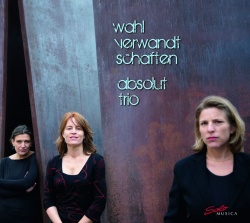 Artists: Absolut Trio
Artists: Absolut Trio
Title: Wahlverwandtschaften – Werke von Schubert, Schumann, Andreae, Käser und Lee
Catalogue No.: SM 180
Release: 18.02.2013
Description
The German term Wahlverwandtschaften “elective affinities” was originally used to describe the tendency of chemical substances to separate from their original compound to combine with elements of another compound. Goethe adapted it in referring allegorically to the fate of the two couples dealt with in his 1809 novel of the same name.
The works presented on this CD are grouped in accordance with the idea of elective affinities. Several of the pieces are removed from their original contexts: the movements from Schubert’s Trios in B flat major and E flat major from their place in the composer’s oeuvre, the two transcriptions of Schumann’s vocal duets from their respective collections. Now they enclose contemporary works: Mischa Käser’s Piano Trio and Junghae Lee’s Sonorletten.
Three experienced and enthusiastic chamber musicians came together in 2003 to form the Absolut Trio.
Since 2009 the ensemble has consisted of Bettina Boller violin, Judith Gerster cello and Stefka Perifanova piano.
Artistic involvement with contemporary music is of prime importance for the three musicians of the Absolut Trio, which is why they commission works at regular intervals. Eight weighty works for piano trio (some with live electronics) have come into being in that way and they are integrated into richly evocative programmes as trouvailles and rare items that deserve to be exposed to the light of day.
Tracklist
Trio f-moll für Klavier, Violine und Violoncello, op. 1Franz Schubert
Andante un poco moderato aus dem Klaviertrio op. 99Mischa Käser
Klaviertrio Nr. 1Franz Schubert
Andante con moto aus dem Klaviertrio op. 100
Robert Schumann
Liebhabers Ständchen, op. 34,2 bearb. für Klaviertrio
Junghae Lee
Sonorletten für Klaviertrio und Elektronik
Diana Ketler & Konstantin Lifschitz – Love Songs
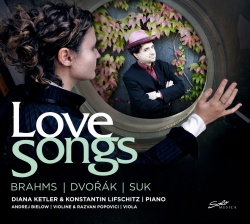 Artists: Diana Ketler, Konstantin Lifschitz
Artists: Diana Ketler, Konstantin Lifschitz
Title: Love Songs
Catalogue No.: SM 175
Release: 22.10.2012
Description
In this programme of some of their favourite Romantic duets the musicians journey through the subliminal passion, bucolic nostalgia and gentle irony of Brahms’ Liebeslieder-Walzer,as well as the intimacy and warmth of his songs Wir Wandelten and Wie Melodien zieht es mir. Then they continue with the exuberant admiration for the universe in Dvorak’s Slavonic Dances, the ecstatic desire of Suk’s Love Song, and, finally, the spiritual adoration of nature in Dvorak’s Silent Woods and In the Spinning Room.
Diana and Konstantin became friends in their student years at the Royal Academy of Music in London. Since then they musical paths crossed many times due to their inner connection, friendship and shared aesthetic interests.
Diana was described by György Ligeti as “a pianist with an unusual musical intelligence”, while the Onaku No Tomo, Tokyo, wrote about her “profoundly lyrical sound and perfectly refined technique”. Her passion for chamber music has led her to found the Ensemble Raro, which the New York Concert Review called “one of the best, most versatile young groups before the public”. She also started the Chiemgauer Musikfrühling Chamber Music Festival in Bavaria, where she is the artistic director. Diana is a Professor of Piano at the Royal Academy of Music in London.
Konstantin is one of the most celebrated performers of his generation. The Frankfurter Allgemeine Zeitung calls him “a phenomenon”. He has an exceptionally vast solo and chamber music repertoire. His many Bach recordings, starting with the legendary Golberg Variations, which the New York Times has called “the most powerful pianistic interpretation since Glen Gould”, continue to fascinate both critics and listeners. Konstantin is a Professor of Piano at the Music Academy in Lucerne.
Tracklist
Liebeslieder Walzer op.52 und op.65, fur Klavier zu vier HandenWir wandelten. (Viola + Klavier) op. 96/2
Wie Melodien zieht es mir. (Viola + Klavier) op. 105/1
Antonin Dvořák
4 Slawische Tänze für Klavier zu 4 Händen op. 72
Waldesruhe op. 68/5 (für Klavier zu vier Händen)
In den Spinnstuben op. 68/1 (für Klavier zu vier Händen)
Josef Suk
Love Song (für Violine und Klavier)
Max Müller – Ewig Dein Mozart – Lieder und Briefe eines Komponisten
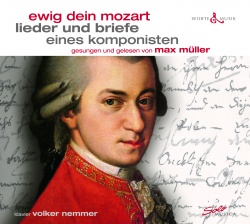 Künstler: Max Müller
Künstler: Max Müller
Titel: Ewig Dein Mozart – Lieder und Briefe eines Komponisten
Katalog Nr.: SM 179
Veröffentlichung: 15.10.2012
Produktbeschreibung
„Ewig Dein Mozart“ CD von Schauspieler und Sänger Max Müller bekannt als Michi Mohr von den “Rosenheim-Cops.
Nach seinem Studium an der Hochschule für Musik und darstellende Kunst in Wien, widmete sich Max Müller zunächst einmal der Schauspielkunst mit zahlreichen Bühnen- und TV Rollen. Als bayerischer Polizeiobermeister „Michi Mohr“ in der ZDF Erfolgsserie „Die Rosenheim-Cops“ ist er längst Kult!
Der klassische Sänger Max Müller ist vor allen Dingen in seiner Heimat Österreich
geschätzt und anerkannt. Sein Operndebüt als lyrischer Bariton in der Kirchenoper
„Franziskus“ im „Carinthischen Sommer“ ließ die Fachwelt und die Kritiker aufhorchen.
Mit der CD „Ewig Dein Mozart“ stellt sich Max Müller auch eindruckvoll in Deutschland als Sänger vor. Er kombiniert Briefe des Komponisten mit ausgewählten
Liedern, die er “mit köstlichem Witz liest, und emotionalem Tiefgang interpretiert“ (Prof. Gerda Fröhlich, Intendantin Carinthischer Sommer)
Die Presse schrieb über sein gleichnamiges Konzert: „Man möchte nicht glauben, dass man aus jedem Mozartlied ein kleines szenisches Erlebnis machen kann. Max Müller belehrte sein Publikum eines besseren!“
Tracklist
| Ewig Dein Mozart | |
| Menuett für Klavier, G-Dur, KV 1 | Lied |
| Brief an die Schwester – Neapel, 05.06.1770 | Sprache |
| Das Kinderspiel KV 598 | Lied |
| Brief an den Vater, München – 29.09.1777 und 30.09.1777 | Sprache |
| Ariette „Dans un bois solitaire” KV 308 | Lied |
| Brief an das Bäsle | Sprache |
| Arie ”Männer suchen stets zu naschen” KV 433 | Lied |
| Brief an den Abbé Bullinger – Paris, 05.07.1778 | Sprache |
| An die Einsamkeit KV 391 | Lied |
| Brief an den Vater – Wien, 09.05.1781 | Sprache |
| Die betrogene Welt KV 474 | Lied |
| Brief an den Vater – Wien, 09.06.1781 | Sprache |
| Lied der Freiheit KV 506 | Lied |
| Brief an den Vater – Wien, 15.12.1781 | Sprache |
| Die Verschweigung KV 518 | Lied |
| Brief an die Baronin von Waldstädten – Wien, 02.10.1782 | Sprache |
| Canzonetta „Ridente la calma” KV 152 | Lied |
| Brief an die Schwester – Wien, 18.08.1784 | Sprache |
| Das Veilchen KV 476 | Lied |
| Brief an den Vater – Wien, 04.04.1787 | Sprache |
| Abendempfindung KV 523 | Lied |
| Brief an Konstanze Mozart – Wien, 06.06.1791 | Sprache |
| „Brüder, laßt uns lustig sein” aus dem Singspiel „Zaide” KV 344 | Lied |
| Brief an Michael Puchberg – Wien, 12.07.1789 | Sprache |
| Sehnsucht nach dem Frühlinge KV 344 | Lied |
| Brief an Konstanze Mozart – Wien, 08.10.1791 und 09.10.1791 | Sprache |
| Bonus: Eine kleine deutsche Kantate KV 619 | Lied |
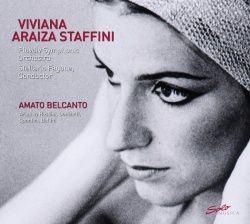
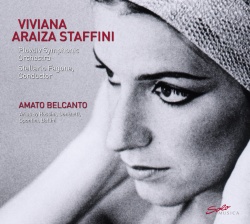 Artists:
Artists: 

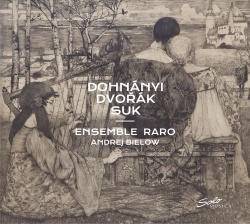
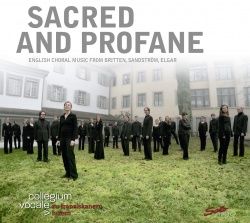
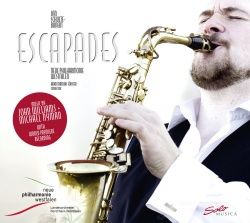


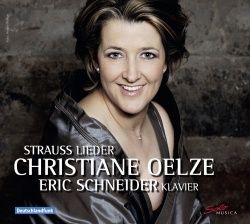
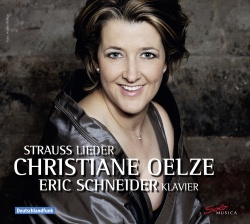 Artists:
Artists: 